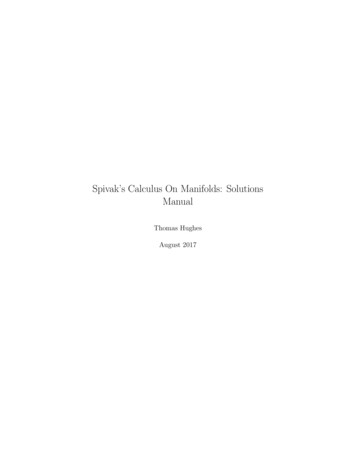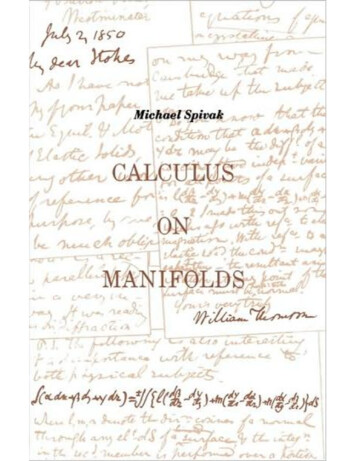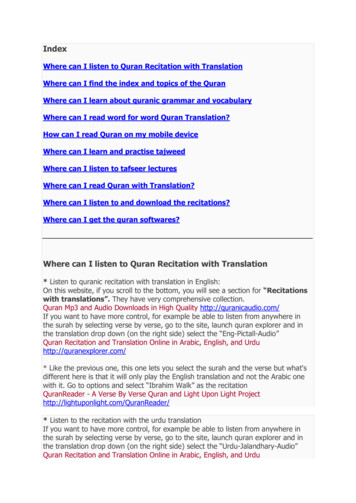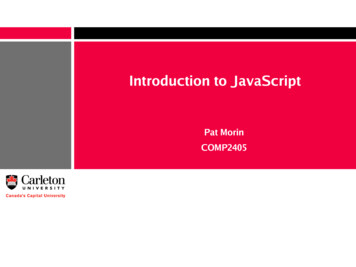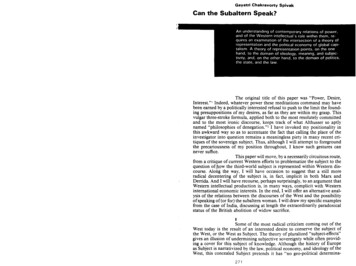
Transcription
Gayatri Chakravorty SpivakCan the Subaltern Speak?An understanding of contemporary relations of power,and of the Western intellectual's role within them, requires an examination of the intersection of a theory ofrepresentation and the political economy of global capitalism. A theory of representation points, on the onehand, to the domain of ideology, meaning, and subjectivity, and, on the other hand, to the domain of politics,the state, and the law.The original title of this paper was "Power, Desire,Interest."1 Indeed, whatever power these meditations command may havebeen earned by a politically interested refusal to push to the limit the founding presuppositions of my desires, as far as they are within my grasp. Thisvulgar three-stroke formula, applied both to the most resolutely committedand to the most ironic discourse, keeps track of what Althusser so aptlynamed "philosophies of denegation."2 I have invoked my positionality inthis awkward way so as to accentuate the fact that calling the place of theinvestigator into question remains a meaningless piety in many recent critiques of the sovereign subject. Thus, although I will attempt to foregroundthe precariousness of my position throughout, I know such gestures cannever suffice.This paper will move, by a necessarily circuitous route,from a critique of current Western efforts to problematize the subject to thequestion oflllgw the third-world subject is represented within Western discourse. Along the way, I will have occasion to suggest that a still moreradical decentering of the subject is, in fact, implicit in both Marx andDerrida. And I will have recourse, perhaps surprisingly, to an argument thatWestern intellectual production is, in many ways, complicit with Westerninternational economic interests. In the end, I will offer an alternative analysis of the relations between the discourses of the West and the possibilityof speaking of (or for) the subaltern woman. I will draw my specific examplesfrom the case of India, discussing at length the extraordinarily paradoxicalstatus of the British abolition of widow sacrifice.ISome of the most radical criticism coming out of theWest today is the result of an interested desire to conserve the subject ofthe West, or the West as SUbject. The theory of pluralized "subject-effects"gives an illusion of undermining SUbjective sovereignty while often providing a cover for this subject of knowledge. Although the history of Europeas Subject is narrativized by the law, political economy, and ideology of theWest, this concealed Subject pretends it has "no geo-political determina271
Gayatri Chakravorty Spivaktions." The much-publicized critique of the sovereign subject thus actuallyinaugurates a Subject. I will argue for this conclusion by considering a textby two great practitioners of the critique: "Intellectuals and Power: A Conversation between Michel Foucault and Gilles Deleuze. "3I have chosen this friendly exchange between two activist philosophers of history because it undoes the opposition between authoritativetheoretical production and the unguarded practice of conversation, enablingone to glimpse the track of ideology. The participants in this conversationemphasize the most important contributions of French poststructuralist theory: first, that the networks of power/desire/interest are so heterogeneousthat their reduction to a coherent narrative is counterproductive-a persistent critique is needed; and second, that intellectuals must attempt todisclose and know the discourse of society's Other. Yet the two systematically ignore the question of ideology and their own implication in intellectual and economic history.Although one of its chief presuppositions is the critique of thesovereign subject, the conversation between Foucault and Deleuze is framedby two monolithic and anonymous subjects-in-revolution: "A Maoist" (FD,205) and "the workers' struggle" (FD, 217). Intellectuals, however, are namedand differentiated; moreover, a Chinese Maoism is nowhere operative.Maoism here simply creates an aura of narrative specificity, which wouldbe a harmless rhetorical banality were it not that the innocent appropriationof the proper name "Maoism" for the eccentric phenomenon of Frenchintellectual "Maoism" and subsequent "New Philosophy" symptomaticallyrenders "Asia" transparent. 4Deleuze's reference to the workers' struggle is equally problematic; it is obviously a genuflection: "We are unable to touch [power] inany point of its application without finding ourselves confronted by thisdiffuse mass, so that we are necessarily led . to the desire to blow it upcompletely. Every partial revolutionary attack or defense is linked in thisway to the workers' struggle" (FD, 217). The apparent banality signals adisavowal. The statement ignores the international division of labor, a gesture that often marks poststructuralist political theory.5 The invocation ofthe workers' struggle is baleful in its very innocence; it is incapable of dealingwith global capitalism: the sUbject-production of worker and unemployedwithin nation-state ideologies in its Center; the increasing subtraction of theworking class in the Periphery from the realization of surplus value andthus from "humanistic" training in consumerism; and the large-scale presence of paracapitalist labor as well as the heterogeneous structural status ofagriculture in the Periphery. Ignoring the international division of labor;rendering "Asia" (and on occasion "Africa") transparent (unless the subjectis ostensibly the "Third World"); reestablishing the legal subject of socializedcapital-these are problems as common to much poststructuralist as to structuralist theory. Why should such occlusions be sanctioned in precisely thoseintellectuals who are our best prophets of heterogeneity and the Other?The link to the workers' struggle is located in the desire to blowup power at any point of its application. This site is apparently based on asimple valorization of any desire destructive of any power. Walter Benjamincomments on Baudelaire's comparable politics by way of quotations fromMarx:272Marx continues in his description of the conspirateursde profession as follows: " . They have no other aimbut the immediate one of overthrowing the existinggovernment, and they profoundly despise the moretheoretical enlightenment of the workers as to theirclass interests. Thus their anger-not proletarian butplebian-at the habits noirs (black coats), the more orless educated people who represent [vertretenjthat sideof the movement and of whom they can never becomeentirely independent, as they cannot of the official representatives [Reprasentantenj of the party." Baudelaire's political insights do not go fundamentally beyond the insights of these professional conspirators.He could perhaps have made Flaubert's statement, "Ofall of politics I understand only one thing: the revolt,"his own. 6The link to the workers' struggle is located, simply, in desire.Elsewhere, Deleuze and Guattari have attempted an alternative definitionof desire, revising the one offered by psychoanalysis: "Desire does not lackanything; it does not lack its object. It is, rather, the subject that is lackingin desire, or desire that lacks a fixed subject; there is no fixed subject exceptby repression. Desire and its object are a unity: it is the machine, as amachine of a machine. Desire is machine, the object of desire also a connected machine, so that the product is lifted from the process of producing,and something detaches itself from producing to product and gives a leftoverto the vagabond, nomad subject."7This definition does not alter the specificity of the desiring subject(or leftover subject-effect) that attaches to specific instances of desire or toproduction of the desiring machine. Moreover, when the connection between desire and the subject is taken as irrelevant or merely reversed, thesubject-effect that surreptitiously emerges is much like the generalized ideological subject of the theorist. This may be the legal subject of socializedcapital, neither labor nor management, holding a "strong" passport, usinga "strong" or "hard" currency, with supposedly unquestioned access to dueprocess. It is certainly not the desiring subject as Other.The failure of Deleuze and Guattari to consider the relationsbetween desire, power, and subjectivity renders them incapable of articulating a theory of interests. In this context, their indifference to ideology (atheory of which is necessary for an understanding of interests) is strikingbut consistent. Foucault's commitment to "genealogical" speculation prevents him from locating, in "great names" like Marx and Freud, watershedsin some continuous stream of intellectual history.8 This commitment hascreated an unfortunate resistance in Foucault's work to "mere" ideologicalcritique. Western speculations on the ideological reproduction of social relations belong to that mainstream, and it is within this tradition that AIthusser writes: "The reproduction of labour power requires not only a reproduction of its skills, but also at the same time, a reproduction of itssubmission to the ruling ideology for the workers, and a reproduction ofthe ability to manipulate the ruling ideology correctly for the agents of273
Gayatri Chakravorty Spivakexploitation and repression, so that they, too, will provide for the domination of the ruling class 'in and by words' [par la paroleJ."9When Foucault considers the pervasive heterogeneity of power,he does not ignore the immense institutional heterogeneity that Althusserhere attempts to schematize. Similarly, in speaking of alliances and systemsof signs, the state and war-machines (mille plateaux), Deleuze and Guattariare opening up that very field. Foucault cannot, however, admit that adeveloped theory of ideology recognizes its own material production ininstitutionality, as well as in the "effective instruments for the formationand accumulation of knowledge" (PK, 102). Because these philosophersseem obliged to reject all arguments naming the concept of ideology as onlyschematic rather than textual, they are equally obliged to produce a mechanically schematic opposition between interest and desire. Thus they alignthemselves with bourgeois sociologists who fill the place of ideology with acontinuistic "unconscious" or a parasubjective "culture." The mechanicalrelation between desire and interest is clear in such sentences as: "We neverdesire against our interests, because interest always follows and finds itselfwhere desire has placed it" (FD, 215). An undifferentiated desire is the agent,and power slips in to create the effects of desire: "power . produces positiveeffects at the level of desire-and also at the level of knowledge" (PK, 59).This parasubjective matrix, cross-hatched with heterogeneity,ushers in the unnamed Subject, at least for those intellectual workers influenced by the new hegemony of desire. The race for "the last instance" isnow between economics and power. Because desire is tacitly defined on anorthodox model, it is unitarily opposed to "being deceived." Ideology as"false consciousness" (being deceived) has been called into question byAlthusser. Even Reich implied notions of collective will rather than a dichotomy of deception and undeceived desire: "We must accept the screamof Reich: no, the masses were not deceived; at a particular moment, theyactually desired a fascist regime" (FD, 215).These philosophers will not entertain the thought of constitutivecontradiction-that is where they admittedly part company from the Left.In the name of desire, they reintroduce the undivided subject into the discourse of power. Foucault often seems to conflate "individual" and "subject"; 10 and the impact on his own metaphors is perhaps intensified in hisfollowers. Because of the power of the word "power," Foucault admits tousing the "metaphor of the point which progressively irradiates its surroundings." Such slips become the rule rather than the exception in lesscareful hands. And that radiating point, animating an effectively heliocentricdiscourse, fills the empty place of the agent with the historical sun of theory,the Subject of Europe. I IFoucault articulates another corollary of the disavowal of the roleof ideology in reproducing the social relations of production: an unquestioned valorization of the oppressed as subject, the "object being," as Deleuze admiringly remarks, "to establish conditions where the prisonersthemselves would be able to speak." Foucault adds that "the masses knowperfectly well, clearly" -once again the thematics of being undeceived-"theyknow far better than [the intellectual] and they certainly say it very well"(FD, 206, 207).What happens to the critique of the sovereign subject in thesepronouncements? The limits of this representationalist realism are reached274with Deleuze: "Reality is what actually happens in a factory, in a school,in barracks, in a prison, in a police station" (FD, 212). This foreclosing ofthe necessity of the difficult task of counterhegemonic ideological productionhas not been salutary. It has helped positivist empiricism-the justifyingfoundation of advanced capitalist neocolonialism-to define its own arenaas "concrete experience," "what actually happens." Indeed, the concreteexperience that is the guarantor of the political appeal of prisoners, soldiers,and schoolchildren is disclosed through the concrete experience of the intellectual, the one who diagnoses the episteme. 12 Neither Deleuze nor Foucault seems aware that the intellectual within socialized capital, brandishingconcrete experience, can help consolidate the international division oflabor.The unrecognized contradiction within a position that valorizesthe concrete experience of the oppressed, while being so uncritical aboutthe historical role of the intellectual, is maintained by a verbal slippage.Thus Deleuze makes this remarkable pronouncement: "A theory is like abox of tools. Nothing to do with the signifier" (FD, 208). Considering thatthe verbalism of the theoretical world and its access to any world definedagainst it as "practical" is irreducible, such a declaration helps only theintellectual anxious to prove that intellectual labor is just like manual labor.It is when signifiers are left to look after themselves that verbal slippageshappen. The signifier "representation" is a case in point. In the same dismissive tone that severs theory's link to the signifier, Deleuze declares,"There is no more representation; there's nothing but action"-"action oftheory and action of practice which relate to each other as relays and formnetworks" (FD, 206-7). Yet an important point is being made here: theproduction of theory is also a practice; the opposition between abstract"pure" theory and concrete "applied" practice is too quick and easy.13If this is, indeed, Deleuze's argument, his articulation of it isproblematic. Two senses of representation are being run together: representation as "speaking for," as in politics, and representation as "re-presentation," as in art or philosophy. Since theory is also only "action," thetheoretician does not represent (speak for) the oppressed group. Indeed, thesubject is not seen as a representative consciousness (one re-presenting reality adequately). These two senses of representation-within state formationand the law, on the one hand, and in subject-predication, on the other-arerelated but irreducibly discontinuous. To cover over the discontinuity withan analogy that is presented as a proof reflects again a paradoxical subjectprivileging. 14 Because "the person who speaks and acts . is always a multiplicity," no "theorizing intellectual . [or] party or . union" can represent "those who act and struggle" (FD, 206). Are those who act and strugglemute, as opposed to those who act and speak (FD, 206)? These immenseproblems are buried in the differences between the "same" words: consciousness and conscience (both conscience in French), representation andre-presentation. The critique of ideological subject-constitution within stateformations and systems of political economy can now be effaced, as can theactive theoretical practice of the "transformation of consciousness." Thebanality of leftist intellectuals' lists of self-knowing, politically canny subalterns stands revealed; representing them, the intellectuals represent themselves as transparent.If such a critique and such a project are not to be given up, theshifting distinctions between representation within the state and political275
Gayatri Chakravorty Spivakeconomy, on the one hand, and within the theory of the Subject, on theother, must not be obliterated. Let us consider the play of vertreten ("represent" in the first sense) and darstellen ("re-present" in the second sense)in a famous passage in The Eighteenth Brumaire of Louis Bonaparte, whereMarx touches on "class" as a descriptive and transformative concept in amanner somewhat more complex than Althusser's distinction between classinstinct and class position would allow.Marx's contention here is that the descriptive definition of a classcan be a differential one-its cutting off and difference from all other classes:"in so far as millions offamilies live under economic conditions of existencethat cut off their mode oflife, their interest, and their formation from thoseof the other classes and place them in inimical confrontation [feindlichgagenf1berstellen], they form a class."15 There is no such thing as a "classinstinct" at work here. In fact, the collectivity of familial existence, whichmight be considered the arena of "instinct," is discontinuous with, thoughoperated by, the differential isolation of classes. In this context, one far morepertinent to the France of the 1970s than it can be to the internationalperiphery, the formation of a class is artificial and economic, and the economic agency or interest is impersonal because it is systematic and heterogeneous. This agency or interest is tied to the Hegelian critique of theindividual subject, for it marks the subject's empty place in that processwithout a subject which is history and political economy. Here the capitalistis defined as "the conscious bearer [Trager] of the limitless movement ofcapital."16 My point is that Marx is not working to create an undividedsubject where desire and interest coincide. Class consciousness does notoperate toward that goal. Both in the economic area (capitalist) and in thepolitical (world-historical agent), Marx is obliged to construct models of adivided and dislocated subject whose parts are not continuous or coherentwith each other. A celebrated passage like the description of capital as theFaustian monster brings this home vividlyYThe following passage, continuing the quotation from The Eighteenth Brumaire, is also working on the structural principle of a dispersedand dislocated class subject: the (absent collective) consciousness of thesmall peasant proprietor class finds its "bearer" in a "representative" whoappears to work in another's interest. The word "representative" here is not"darstellen "; this sharpens the contrast Foucault and Deleuze slide over,the contrast, say, between a proxy and a portrait. There is, of course, arelationship between them, one that has received political and ideologicalexacerbation in the European tradition at least since the poet and the sophist,the actor and the orator, have both been seen as harmful. In the guise of apost-Marxist description of the scene of power, we thus encounter a mucholder debate: between representation or rhetoric as tropology and as persuasion. Darstellen belongs to the first constellation, vertreten-with strongersuggestions of substitution-to the second. Again, they are related, but running them together, especially in order to say that beyond both is whereoppressed subjects speak, act, and know for themselves, leads to an essentialist, utopian politics.Here is Marx's passage, using "vertreten" where the English use"represent," discussing a social "subject" whose consciousness and Vertretung (as much a substitution as a representation) are dislocated and incoherent: The small peasant proprietors "cannot represent themselves; they276must be represented. Their representative must appear simultaneously astheir master, as an authority over them, as unrestricted governmental powerthat protects them from the other classes and sends them rain and sunshinefrom above. The political influence [in the place of the class interest, sincethere is no unified class subject] of the small peasant proprietors thereforefinds its last expression [the implication of a chain of substitutions- Vertretungen-is strong here] in the executive force [Exekutivgewalt-Iess personal in German] subordinating society to itself."Not only does such a model of social indirection-necessary gapsbetween the source of "influence" (in this case the small peasant proprietors),the "representative" (Louis Napoleon), and the historical-political phenomenon (executive control)-imply a critique of the subject as individual agentbut a critique even of the subjectivity of a collective agency. The necessarilydislocated machine of history moves because "the identity of the interests"of these proprietors "fails to produce a feeling of community, national links,or a political organization." The event of representation as Vertretung (inthe constellation of rhetoric-as-persuasion) behaves like a Darstellung (orrhetoric-as-trope), taking its place in the gap between the formation of a(descriptive) class and the nonformation of a (transformative) class: "In sofar as millions of families live under economic conditions of existence thatseparate their mode of life . they form a class. In so far as . the identityof their interests fails to produce a feeling of community . they do notform a class." The complicity of Vertreten and Darstellen, their identity-indifference as the place of practice-since this complicity is precisely whatMarxists must expose, as Marx does in The Eighteenth Brumaire-can onlybe appreciated if they are not conflated by a sleight of word.It would be merely tendentious to argue that this textualizes Marxtoo much, making him inaccessible to the common "man," who, a victimof common sense, is so deeply placed in a heritage of positivism that Marx'sirreducible emphasis on the work of the negative, on the necessity for defetishizing the concrete, is persistently wrested from him by the strongestadversary, "the historical tradition" in the air. 18 I have been trying to pointout that the uncommon "man," the contemporary philosopher of practice,sometimes exhibits the same positivism.The gravity of the problem is apparent if one agrees that thedevelopment of a transformative class "consciousness" from a descriptiveclass "position" is not in Marx a task engaging the ground level of consciousness. Class consciousness remains with the feeling of community thatbelongs to national links and political organizations, not to that other feelingof community whose structural model is the family. Although not identifiedwith nature, the family here is con stellated with what Marx calls "naturalexchange," which is, philosophically speaking, a "placeholder" for use value. 19"Natural exchange" is contrasted to "intercourse with society," where theword "intercourse" (Verkehr) is Marx's usual word for "commerce." This"intercourse" thus holds the place of the exchange leading to the productionof surplus value, and it is in the area of this intercourse that the feeling ofcommunity leading to class agency must be developed. Full class agency (ifthere were such a thing) is not an ideological transformation of consciousness on the ground level, a desiring identity of the agents and their interestthe identity whose absence troubles Foucault and Deleuze. It is a contestatory replacement as well as an appropriation (a supplementation) of some277
Gayatri Chakravorty Spivakthing that is "artificial" to begin with-"economic conditions of existencethat separate their mode of life." Marx's formulations show a cautious respect for the nascent critique of individual and collective subjective agency.The projects of class consciousness and of the transformation of consciousness are discontinuous issues for him. Conversely, contemporary invocations of "libidinal economy" and desire as the determining interest, combined with the practical politics of the oppressed (under socialized capital)"speaking for themselves," restore the category of the sovereign subjectwithin the theory that seems most to question it.No doubt the exclusion of the family, albeit a family belongingto a specific class formation, is part of the masculine frame within whichMarxism marks its birth.20 Historically as well as in today's global politicaleconomy, the family's role in patriarchal social relations is so heterogeneousand contested that merely replacing the family in this problematic is notgoing to break the frame. Nor does the solution lie in the positivist inclusionof a monolithic collectivity of "women" in the list of the oppressed whoseunfractured subjectivity allows them to speak for themselves against anequally monolithic "same system."In the context of the development of a strategic, artificial, andsecond-level "consciousness," Marx uses the concept of the patronymic,always within the broader concept of representation as Vertretung: The smallpeasant proprietors "are therefore incapable of making their class interestvalid in their proper name rim eigenen Namenj, whether through a parliament or through a convention." The absence of the nonfamilial artificialcollective proper name is supplied by the only proper name "historicaltradition" can offer-the patronymic itself-the Name of the Father: "Historical tradition produced the French peasants' belief that a miracle wouldoccur, that a man named Napoleon would restore all their glory. And anindividual turned up"-the untranslatable "es fand sich" (there found itselfan individual?) demolishes all questions of agency or the agent's connectionwith his interest-"who gave himself out to be that man" (this pretense is,by contrast, his only proper agency) "because he carried [tragt-the wordused for the capitalist's relationship to capital] the Napoleonic Code, whichcommands" that "inquiry into paternity is forbidden." While Marx hereseems to be working within a patriarchal metaphorics, one should note thetextual subtlety of the passage. It is the Law of the Father (the NapoleonicCode) that paradoxically prohibits the search for the natural father. Thus,it is according to a strict observance of the historical Law of the Father thatthe formed yet unformed class's faith in the natural father is gainsaid.I have dwelt so long on this passage in Marx because it spellsout the inner dynamics of Vertretung, or representation in the politicalcontext. Representation in the economic context is Darstellung, the philosophical concept of representation as staging or, indeed, signification, whichrelates to the divided subject in an indirect way. The most obvious passageis well known: "In the exchange relationship [Austauschverhaltnisj of commodities their exchange-value appeared to us totally independent of theiruse-value. But if we subtract their use-value from the product of labour, weobtain their value, as it was just determined [bestimmtj. The common element which represents itself [sich darstelltj in the exchange relation, or theexchange value of the commodity, is thus its value."21278According to Marx, under capitalism, value, as produced in necessary and surplus labor, is computed as the representation/sign of objectified labor (which is rigorously distinguished from human activity). Conversely, in the absence of a theory of exploitation as the extraction(production), appropriation, and realization of (surplus) value as representation of labor power, capitalist exploitation must be seen as a variety ofdomination (the mechanics of power as such). "The thrust of Marxism,"Deleuze suggests, "was to determine the problem [that power is more diffusethan the structure of exploitation and state formation] essentially in termsof interests (power is held by a ruling class defined by its interests)" (FD,214).One cannot object to this minimalist summary of Marx's project,just as one cannot ignore that, in parts of the Anti-Oedipus, Deleuze andGuattari build their case on a brilliant if "poetic" grasp of Marx's theory ofthe money form. Yet we might consolidate our critique in the followingway: the relationship between global capitalism (exploitation in economics)and nation-state alliances (domination in geopolitics) is so macrological thatit cannot account for the micrological texture of power. To move towardsuch an accounting one must move toward theories of ideology-of subjectformations that micrologically and often erratically operate the interests thatcongeal the macrologies. Such theories cannot afford to overlook the category of representation in its two senses. They must note how the staging ofthe world in representation-its scene of writing, its Darstellung-dissimulates the choice of and need for "heroes," paternal proxies, agents of powerVertretung.My view is that radical practice should attend to this doublesession of representations rather than reintroduce the individual subjectthrough totalizing concepts of power and desire. It is also my view that, inkeeping the area of class practice on a second level of abstraction, Marxwas in effect keeping open the (Kantian and) Hegelian critique of the individual subject as agent.22 This view does not oblige me to ignore that, byimplicitly defining the family and the mother tongue as the ground levelwhere culture and convention seem nature's own way of organizing "her"own subversion, Marx himself rehearses an ancient subterfuge. 23 In the context of poststructura
Can the Subaltern Speak? An understanding of contemporary relations of power, and of the Western intellectual's role within them, re quires an examination of the intersection of a theory of representat

